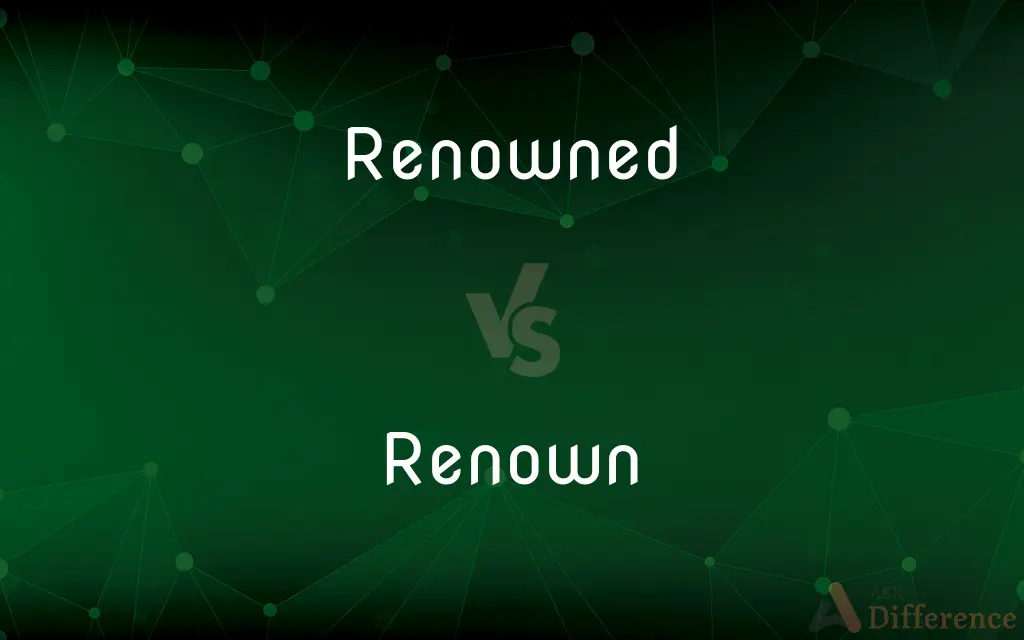Renowned vs. Renown — What's the Difference?
Edited by Tayyaba Rehman — By Maham Liaqat — Updated on March 12, 2024
Renowned is an adjective describing someone or something famous, while renown is a noun referring to the state of being widely acclaimed and honored.

Difference Between Renowned and Renown
Table of Contents
ADVERTISEMENT
Key Differences
Renowned is used to describe individuals, places, or things that have received widespread fame and recognition for their achievements or qualities. It suggests a positive reputation that has been earned through notable accomplishments. In contrast, renown refers to the condition of being celebrated or highly esteemed. It is the fame or acclaim that results from distinguished acts or qualities.
The use of "renowned" typically precedes a noun, attributing fame directly to its subject. For instance, when we say a "renowned scientist," we are directly praising the individual's celebrated status in their field. Whereas "renown" functions as the subject or object within a sentence, focusing on the concept of fame itself, such as in "The scientist gained renown for their groundbreaking research."
While "renowned" explicitly modifies a noun to convey that it is famous or highly regarded, "renown" encapsulates the idea of fame or acclaim without being attached to a specific subject. For example, a city might be renowned for its historic architecture, illustrating the city's fame in this regard, while a person achieving renown has gained widespread recognition.
The distinction between these terms highlights their grammatical roles and the nuances in expressing the concept of fame. "Renowned" acts directly to assign fame to a subject, whereas "renown" deals with the abstract notion of fame that one possesses or acquires.
Understanding when to use "renowned" versus "renown" is crucial for accurate communication, particularly in discussions about achievements, history, and personal accomplishments. "Renowned" provides a descriptive attribute to a subject, while "renown" serves to discuss the general state or condition of being famous.
ADVERTISEMENT
Comparison Chart
Part of Speech
Adjective
Noun
Definition
Describes someone or something as famous.
The condition of being widely honored or acclaimed.
Usage
Directly modifies a subject.
Used as a subject or object in sentences.
Example
"A renowned artist."
"The artist's renown spread far and wide."
Context
Attribute fame to individuals, places, or things.
Discusses the concept or state of fame itself.
Compare with Definitions
Renowned
Famous or well-known.
The renowned novelist received another award.
Renown
Widely acclaimed or honored.
The poet's renown was not confined to his own country.
Renowned
Celebrated for a particular reason.
The restaurant is renowned for its innovative cuisine.
Renown
Fame achieved through deeds.
Their deeds of valor brought them great renown.
Renowned
Having a distinguished reputation.
He became renowned for his contributions to science.
Renown
The state of being famous.
Her renown as a singer grew after the release of her hit album.
Renowned
Acknowledged globally.
The city is renowned for its rich cultural heritage.
Renown
Recognition on a wide scale.
The university's renown for excellence in research is well deserved.
Renowned
Highly regarded in a specific field.
She is a renowned expert in renewable energy.
Renown
Esteem or high regard.
The architect gained renown for her sustainable designs.
Renowned
Having renown; famous.
Renown
The quality of being widely known or acclaimed; fame.
Renowned
Famous, celebrated, or well-known; widely praised or highly honored.
The movie “Three Stars” is about world-renowned chefs.
Renown
(Obsolete) Report; rumor.
Renowned
Famous; celebrated for great achievements, for distinguished qualities, or for grandeur; eminent; as, a renowned king.
These were the renowned of the congregation.
Renown
Fame; celebrity; wide recognition.
Renowned
Widely known and esteemed;
A famous actor
A celebrated musician
A famed scientist
An illustrious judge
A notable historian
A renowned painter
Renown
(obsolete) Reports of nobleness or achievements; praise.
Renown
(transitive) To make famous.
Renown
The state of being much known and talked of; exalted reputation derived from the extensive praise of great achievements or accomplishments; fame; celebrity; - always in a good sense.
Nor envy weThy great renown, nor grudge thy victory.
Renown
Report of nobleness or exploits; praise.
This famous duke of Milan,Of whom so often I have heard renown.
Renown
To make famous; to give renown to.
For joi to hear me so renown his son.
The bard whom pilfered pastorals renown.
Renown
The state or quality of being widely honored and acclaimed
Common Curiosities
Can a place have renown?
Yes, places can have renown for various reasons, such as historical significance, natural beauty, or cultural contributions.
What is the difference in usage between "renowned" and "renown"?
"Renowned" is used to directly modify nouns and attribute fame to them, while "renown" refers to the abstract concept of fame itself and is used as a noun in sentences.
How can a writer indicate that something is well-regarded globally?
By describing it as "renowned," indicating that it is recognized and celebrated worldwide.
Is "renowned" only used for people?
No, it can describe anyone or anything that has gained fame, including places, institutions, or works of art.
Is it possible for an unknown individual to become renowned quickly?
Yes, rapid achievements or viral phenomena can lead to sudden fame.
How does someone gain renown?
Through significant achievements, contributions, or excellence in a particular field or activity that earns widespread recognition.
Can "renown" be measured?
While not quantifiable in a strict sense, the extent of renown can be inferred from the spread of recognition and honor across different contexts and populations.
How does popular culture influence renown?
Popular culture can significantly amplify someone's or something's renown through media, entertainment, and public discourse.
How do individuals or entities cultivate their renown?
Through consistent excellence, innovation, or contribution that gains widespread acknowledgment and respect.
Can "renowned" and "renown" be used interchangeably?
No, because "renowned" is an adjective that describes fame, and "renown" is a noun that refers to the state of being famous.
Is "renown" always positive?
Generally, yes, as it implies a positive form of fame or recognition, though the context can vary.
Do "renowned" and "renown" have the same root?
Yes, both words derive from the same historical roots related to fame and recognition.
Can negative actions lead to renown?
Yes, but this is typically distinguished by context and may be referred to with terms indicating notoriety rather than positive fame.
How do historical figures maintain their renown over time?
Through lasting impacts on society, culture, or their field, preserved by historical records, studies, and public memory.
Can renown fade over time?
Yes, as public attention shifts and memories fade, unless efforts are made to preserve and commemorate the achievements or contributions that led to the renown.
Share Your Discovery

Previous Comparison
Addresser vs. Addressee
Next Comparison
Backpack vs. KnapsackAuthor Spotlight
Written by
Maham LiaqatEdited by
Tayyaba RehmanTayyaba Rehman is a distinguished writer, currently serving as a primary contributor to askdifference.com. As a researcher in semantics and etymology, Tayyaba's passion for the complexity of languages and their distinctions has found a perfect home on the platform. Tayyaba delves into the intricacies of language, distinguishing between commonly confused words and phrases, thereby providing clarity for readers worldwide.














































